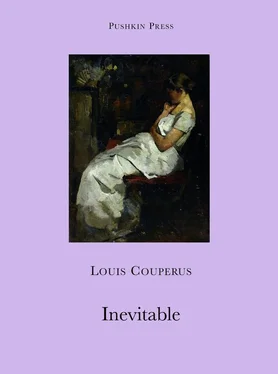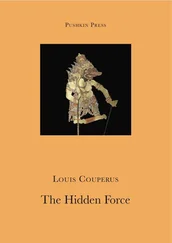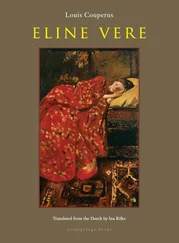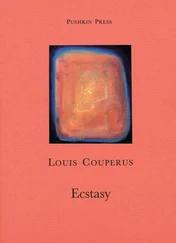“You didn’t forget me completely, did you?”
She shook her head.
“We should never have divorced, should we?”
Again she shook her head.
“We were hot-headed back then, both of us. You mustn’t be hot-headed any more. It makes you nasty and ugly. You’re much sweeter and more beautiful as you are now.”
She smiled faintly.
“I’m glad to have you back,” he whispered, giving her a long kiss on the mouth.
She closed her eyes as he kissed her, while his moustache bristled against her skin and his lips pressed on hers.
“Are you still tired?” he asked. “Do you want to rest a little?”
“Yes,” she said. “I want to put on something more comfortable.”
“You should go to bed for a bit,” he said. “Oh, and I was going to tell you: your friend the princess is coming here this evening.”
“Isn’t Urania angry …?”
“No. I’ve told her everything, she knows the whole story.”
She was glad that Urania wasn’t angry, that she still had a friend.
“And I saw Mrs Uxeley too.”
“She is angry with me, I expect.”
He laughed.
“Poor old thing! No, not angry. She’s put out that she’ll have to do without you. She was very fond of you. She likes beautiful people around her, she told me. She can’t stand an ugly lady’s companion, with no class. Come on, get undressed and lie down for a bit. I’ll leave you alone and find somewhere to sit downstairs.”
They had got up. His eyes had a golden sparkle and an ironic smile played beneath his moustache. He swept her into his arms.
“Corrie,” he said hoarsely. “It’s wonderful to have you back. Tell me, are you mine, are you mine?”
He hugged her to him, almost stifling her, both arms around her, weighing on her.
“Tell me, are you mine?”
“Yes …”
“What was your name for me — when you loved me?”
She hesitated.
“What did you call me?” he insisted, gripping her still tighter. Pushing at his shoulders she fought for breath.
“My Rudy …” she murmured. “My beautiful, gorgeous Rudy …”
Mechanically she cradled his head in her arm. With what seemed a great effort, he let go of her.
“You undress,” he said, “and try to get some sleep. I’ll come back later.”
He left, while she undressed and brushed her hair with his brush, and put some drops of the toilet water he used into the bowl. She closed the top curtains, behind which the afternoon sun was shining, plunging the room into a downy, wine-red gloom. And she crept into the big bed and waited for him, trembling. Her head was empty of thoughts. There was no pain and no memory in her. All that was in her was a single expectation of the slow but inexorable course of life. She felt nothing but a bride, though not an ignorant bride, and in her deepest core she felt herself the wife, in her deepest core the wife of the man she was waiting for. In her mind’s eye, dreamlike, she saw the figures of children … If she were to be truly his wife, she wanted to be not only his lover, but also the mother of his children … She knew that despite his rough manners, he loved the softness of children, and she would want them in her second marriage, as a precious consolation in the times when she was no longer beautiful, no longer young … In her mind’s eye, dreamlike, she saw the figures of children … And she waited for him, listened for his step, longed for him to come, her body quivering in expectation. When he came in and approached her, her arms closed round him in a gesture of deep and conscious certainty, and without a doubt, against his chest, in his arms, she had a sure sense of his male dominance, while the dream of her life — Rome, Duco, the studio — submerged in a vortex of black melancholy …
LOUIS COUPERUS was born in The Hague in 1863 into a family with a distinguished tradition of government service in the Netherlands East Indies, where he spent part of his childhood. Returning to Europe, he obtained a teaching qualification in Dutch, but his real ambitions lay elsewhere. After his early poetry was ridiculed by the literary avant-garde, he turned to fiction with Eline Vere (1889), creating a rich Tolstoyan panorama of upper-class Hague life, against which is set the downfall of his hypersensitive and maladjusted heroine. This was the beginning of a prolific and successful career, in the course of which he produced over twenty novels, as well as numerous collections of stories and travelogues.
In 1891 Couperus married his cousin Elisabeth Baud, a lover of literature and occasional translator, who gave him lifelong companionship and loyal emotional as well as practical support. The marriage remained childless, and much in Couperus’ work is strongly suggestive of a homosexual or at least bisexual orientation. On occasion his prose style betrays his thwarted poetic aspirations, leading one commentator to lament a tendency to overwrite:
He powdered his style as he did his face, he manicured his sentences as he did his nails, he dressed up his novels in the same way as he dressed up his body. This dressing up and embellishing is one of his most conspicuous weaknesses, and together with his tendency to longwindedness and his fatal urge to continue a book beyond its logical ending prevented him from becoming a second Tolstoy, Flaubert or Henry James, in whose class he potentially belonged.
Nevertheless Couperus’ wide and continuing appeal to readers is easy to understand: his great gift for narrative, characterisation and dialogue is allied to a compelling fatalistic vision.
The outbreak of World War I brought four years of enforced confinement within the neutral borders of his native Netherlands, and put a brake on Couperus’ growing reputation in the English-speaking world, where since the 1890s he had enjoyed critical and popular success with a string of translations. As early as 1891 Footsteps of Fate ( Noodlot , 1890) had appealed to Oscar Wilde and his circle, Old People and the Things that Pass ( Van oude mensen de dingen die voorbijgaan, 1906) was praised, albeit faintly, by D H Lawrence, and the ambitious four-novel cycle The Books of the Small Souls ( De boeken der kleine zielen , 1901–1903) won the endorsement of Katherine Mansfield.
Once hostilities ceased the priority was his reintroduction to an international audience. Deciding which of his books was best suited to inaugurate such a relaunch was no easy task: both the brilliant and perceptive colonial novel De stille kracht ( The Hidden Force , 1901) and the explicit homosexuality of De berg van licht ( The Mountain of Light , 1905–1906), centring on the downfall of the androgynous boy-emperor Heliogabalus, were too controversial for the contemporary moral and political climate in the target countries. Though The Hidden Force eventually appeared with some success in a slightly censored version in the UK in 1922 and in 1924 in the US, where the film rights were also sold, the latter novel, in some ways the fictional counterpart of the languid classical tableaux of the painter Lawrence Alma-Tadema (1836–1912) and cited in Mario Praz’s classic study The Romantic Agony as an exemplary decadent novel, remains untranslated.
The final choice was the 1900 novel Langs lijnen van geleidelijkheid , which was published first in America as Inevitable in 1920, in the version by Couperus’ regular translator Alexander Teixeira de Mattos, and the following year in the UK under the (even more) portentous title The Law Inevitable . This study of a young upper-class divorcee’s attempt to build a new, emancipated and culturally fulfilling life in Italy and her eventual return to her ex-husband received rapturous reviews in the US, where the author’s skill, power and versatility and his creation of a “beautiful and passionate” protagonist were widely admired. In Britain, however, the reception was more mixed. There were two main reservations: firstly, the novel’s erotic explicitness and specifically the concluding bedroom scene (which was discreetly bowdlerised in the UK edition); secondly, the title’s suggestion that Cornélie’s story is exemplary and universal. The latter stricture stems from a misapprehension caused by the English title, particularly in its expanded form. In fact Couperus’ Dutch title means something more like ‘slowly but surely’ or ‘little by little’, highlighting the specific, slow-acting chemistry between the heroine and her (ex-)husband.
Читать дальше












